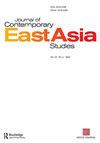Nudging not nagging: leveraging mentorship and patronage in Sino-Uzbek relations, 2017-2022
IF 1.4
Q1 AREA STUDIES
引用次数: 0
Abstract
This paper considers Sino-Uzbek relations by critically assessing the positivist depictions of CA states in their relations with larger countries like China. It uses the post-positivist and constructivist framework and adaptations made from the four-factor analysis framework adopted in the case of Uzbekistan to demonstrate avenues in which Uzbekistan demonstrates active agency in relations with China. This paper argues that Uzbekistan and other CA states utilize nudging strategies which refer to a subtle and often indirect way of encouraging or guiding China’s behavior in a particular direction as opposed to so-called “nagging” which associates with persistent and repetitive pressuring China to perform a certain function. Accordingly, Uzbekistan’s approach to China can be described as the nudging strategy of designing the environment or context which makes China’s choices in its relations with Uzbekistan easier and more attractive in favor of policy decisions desired by the Uzbek government. As is depicted in the narrative of cooperation road maps, Uzbekistan’s approach involved both indirect signaling of certain policy preferences, choice-preserving (involving diversification of foreign partners), and positive reinforcement (through various policy incentives). This contrasts the persistent and repetitive pressuring, criticism, threats, or guilt-tripping, seen in relations between China and other Western states.助推而非唠叨:2017-2022年中乌关系中的师徒关系和赞助关系
本文通过批判性地评估中亚国家与中国等大国关系中的实证主义描述来考虑中乌关系。本文使用后实证主义和建构主义框架,并对乌兹别克斯坦案例中采用的四因素分析框架进行了调整,以展示乌兹别克斯坦在与中国的关系中表现出积极代理的途径。本文认为,乌兹别克斯坦和其他中亚国家使用轻推策略,指的是一种微妙的、通常是间接的方式,鼓励或引导中国在特定方向上的行为,而不是所谓的“唠叨”,即持续和重复地向中国施加压力,要求其履行某种功能。因此,乌兹别克斯坦对中国的做法可以被描述为一种推动策略,即设计环境或背景,使中国在与乌兹别克斯坦的关系中做出选择更容易,更有吸引力,有利于乌兹别克斯坦政府所希望的政策决定。正如合作路线图所描述的那样,乌兹别克斯坦的方法既包括某些政策偏好的间接信号,保留选择(涉及外国合作伙伴的多样化),也包括积极强化(通过各种政策激励)。这与中国和其他西方国家之间持续不断的压力、批评、威胁或内疚形成了鲜明对比。
本文章由计算机程序翻译,如有差异,请以英文原文为准。
求助全文
约1分钟内获得全文
求助全文
来源期刊

Journal of Contemporary East Asia Studies
Social Sciences-Cultural Studies
CiteScore
2.50
自引率
0.00%
发文量
10
审稿时长
6 weeks
 求助内容:
求助内容: 应助结果提醒方式:
应助结果提醒方式:


